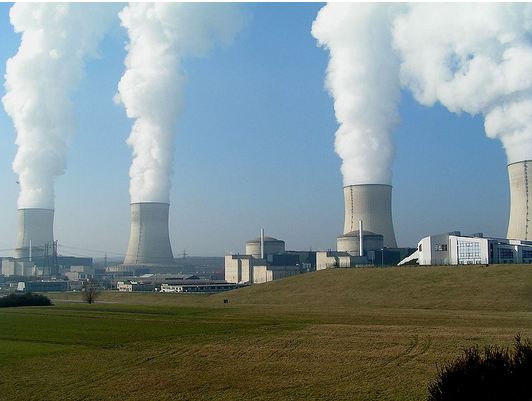Investing
Ongoing French Commitment to Nuclear Power Roils Neighbors
Published:
Last Updated:
The political unity of the European Union is an ongoing work in progress, but fissures are appearing on the issues of nuclear power.
Germany and Luxembourg are now demanding that France shut down its aging Cattenom nuclear power plant (NPP), but Paris is resisting the call. In Germany, the charge is being led by the federal states of Rhineland-Palatinate and Saarland.
Their concerns?
The French government’s mandated stress tests instituted after Japan’s 11 March 2011 nuclear disaster at the Fukushima Daiichi nuclear power complex revealed serious flaws at the elderly Cattenom NPP.
But things might not be so simple, as the Cattenom NPP, built from 1987 to 1992, has the third largest electrical output in France, with it four reactors pumping out 4,200 megawatts.
Dieter Majer, formerly with Germany’s Federal Environment Ministry, said that the Cattenom NPP harbors “an enormous risk potential.” For those with a sense of irony, the newspaper reporting Majer’s comments fired Karl Marx in 1848 for being too “radical.”
Rhineland-Palatinate Energy Minister Eveline Lemke was more blunt, noting simply, “the (Cattenom NPP) poses an enormous risk potential. In our view the (Cattenom) nuclear power plant has failed.” Lemjke added that in order to examine the NPP’s construction and be able to eliminate shortcomings, the French Autorite de Surete Nucleaire must take the reactors off the grid for at least a year, commenting, “We found not only rusted screws and pins but conditions that must be described as deficient.” Experts have long wondered whether the Cattenom nuclear power plant, located in Lorraine, is safe enough to survive an earthquake without damage.
In the aftermath of Fukushima, in August 2011 stress tests were arranged for all 143 nuclear reactors in the EU’s NPPs.
Perhaps not surprisingly, all passed and earlier this year, ASN certified the four reactors at Cattenom as well as the other 54 NPPS in France as “safe,” stating that there is no need to close down a single power plant, according to the results of the stress tests.
In voicing their concerns the German ministers emphasized that a number of key risk situations were not considered in the August 2011 stress tests, including the possible consequences of a plane crash or a terrorist attack along with the issue of providing ongoing coolant water supplies following a natural disaster. Cyber-attacks and human error were also missing from the studies.
The ASN Cattenom inspection ended with 78 “findings,” which found 35 “deviations“ from the norm, leading the ASN to ask Cattenom’s operator, Electricite de France, to provide clarification. Majer diplomatically commented that EDF’s inability to provide the requested data “suggests that the range and the safety significance of defects in not a high safety priority of the operator.”
Finally the ASN’s mechanisms for coping with such problems were far too long, leading Lempke to conclude, “It has to go faster. We will not wait until 2020.”
Responding to the criticism, EDF noted that it had published a 390-page report on its “additional security assessment” of Cattenom, but which, oddly enough, failed to discuss the consequences of a plane crash at tne NPP, a not insubstantial concern, as Cattenom is not far from Luxembourg’s Findel airport, the country’s sole international aerial facility. The concern is not academic, as a decade ago, on 6 November 2002, Luxair Flight 9642, flying from Berlin, crashed in a field near the village of Niederanven during its final approach to Findel airport, killing 20 passengers and crew.
Luxembourg’s Health Minister Mars Di Bartolomeo added that the ultimate goal was the “closure of Cattenom.”
The issue has significant economic consequences for France, as after the United States France is the second largest operator of nuclear power plants in the world, generating 78 percent of its electrical power from its NPPs.
So, as France stalwartly maintains all that its NPPs are safe and Luxembourg and Germany protest, one clear lesson seems to be emerging. If Three Mile Island, Chernobyl and now Fukushima Daiichi have proved anything, it is that nuclear debris from NPP problems is no respecter of municipal, state or international boundaries.
If Luxembourg’s and Germany’s concerns about Cattenom come to pass, the consequences will not be limited to French territory.
Accordingly, in the interests of EU solidarity, Paris should accede to their neighbors’ concerns and promptly shutter the elderly Cattenom NPP.
After all, EDF still has 54 other French NPPs to (mis)manage.
What is the French for “rusted screws and pins?”
Just asking.
By John C.K. Daly of Oilprice.com
Retirement planning doesn’t have to feel overwhelming. The key is finding expert guidance—and SmartAsset’s simple quiz makes it easier than ever for you to connect with a vetted financial advisor.
Here’s how it works:
Why wait? Start building the retirement you’ve always dreamed of. Click here to get started today!
Thank you for reading! Have some feedback for us?
Contact the 24/7 Wall St. editorial team.